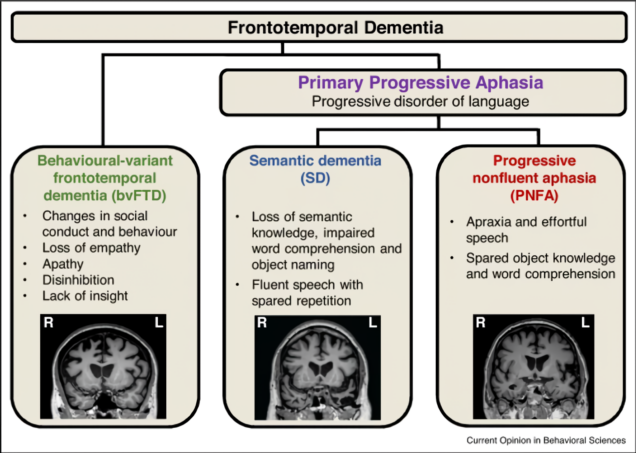Spotlight Blog: Understanding Primary Progressive Aphasia, Bruce Willis and Wendy Williams’s Diagnoses
BU Center for Brain Recovery Researchers Discuss: Understanding Primary Progressive Aphasia, Bruce Willis’s and Wendy Williams’s Diagnoses
The recent diagnoses of Bruce Willis and Wendy Williams have brought a spotlight to a relatively lesser-known condition called primary progressive aphasia (PPA) and its broader category, frontotemporal dementia (FTD). Willis’s family revealed in 2022 that the beloved actor would be retiring due to frontotemporal dementia, following an initial diagnosis of aphasia. Similarly this past February, Wendy Williams’s medical team disclosed her diagnosis of primary progressive aphasia and frontotemporal dementia. Reports regarding these diagnoses have highlighted the impact these conditions have on the two public figures and their families.
At the Center for Brain Recovery, PhD students Nicole Carvalho and Marissa Russell are using their experience researching the two conditions, and working directly with patients to shed light on their complexities and nuances behind these diagnoses. Their work not only contributes to a greater understanding of these conditions but also aims to correct widespread misconceptions.
Defining PPA and FTD
Primary progressive aphasia is a nervous system syndrome that impairs the ability to communicate as a result of the degeneration of brain regions involved in language processing and behavior. It’s a form of neurodegenerative disease and subtype of frontotemporal dementia that specifically affects language comprehension and production (ASHA). In primary progressive aphasia, these areas are progressively damaged over time, leading to slow deterioration in the ability to use and understand language. Frontotemporal dementia, specifically, refers to a group of brain disorders affecting the frontal and temporal lobes, which are crucial for personality, behavior, and language. This umbrella term includes various forms of dementia, including primary progressive aphasia, which lead to nerve cell loss in critical brain areas (MayoClinic).

Misconceptions About PPA
Russell and Carvalho highlight several misconceptions about PPA that they aim to dispel through their research and outreach:
1) That primary progressive aphasia is the same as post-stroke aphasia.
These disorders have different characteristics and prognosis, so it’s important that people understand the difference between them. Unlike post-stroke aphasia, PPA is not caused by a sudden cerebrovascular event (stroke) but rather by degeneration of brain regions involved in language processing. PPA often begins with subtle language difficulties and progresses to more severe impairments. On the other hand, post-stroke aphasia may improve over time with rehabilitation efforts.
2) That it’s just a normal part of aging.
It’s not! While deficits may start off mild (e.g., forgetting a word here and there), it is a neurodegenerative condition that impairs language abilities at an abnormally rapid pace. The development of PPA represents a distinct and pathological process separate from typical age-related changes. If someone experiences significant language difficulties that interfere with daily functioning, it is important to seek medical evaluation.
3) That all people with primary progressive aphasia have the same symptoms.
Apart from individual characteristics such as brain health and the age of onset, there are different subtypes of primary progressive aphasia that differ in initial manifestation of symptoms. The semantic variant is characterized by difficulty understanding or finding words. The nonfluent/agrammatic variant involves difficulty with sentence structure and grammar. The logopenic variant primarily involves problems with finding words and fluency.
4) That primary progressive aphasia only affects language skills.
It primarily affects language skills, but its impact can extend beyond language abilities depending on the specific subtype and stage of the condition. Therefore, it ultimately leads to broader cognitive decline (e.g., difficulties with memory, attention, problem solving, etc).
Looking Ahead
The diagnoses of Bruce Willis and Wendy Williams have opened up conversations about primary progressive aphasia and frontotemporal dementia, conditions that impact many individuals yet aren’t generally well known by the general public. The work of researchers like Nicole Carvalho and Marissa Russell is essential in understanding these conditions, and making developments in the field of brain recovery.
At the Center for Brain Recovery, Marissa Russell is currently working under a grant that aims to use computational models to simulate language decline over time. This also helps to better understand translation and language control errors in Spanish-English bilinguals with semantic dementia (a frontotemporal dementia subtype). Additionally, the project aims to simulate recovery over time in bilinguals with post-stroke aphasia and normal language changes in older healthy bilingual adults.
We asked Nicole Carvalho, who is in the early phases of a new project that will investigate language skills in people with primary progressive aphasia, what are some things she would like people to understand about these disorders and diagnoses? She responded, “one of the common misconceptions about primary progressive aphasia is that it is the loss of intellect. That is not the case. The condition affects language skills, but other cognitive processes remain largely intact. What I would like people to know is that people with PPA are still people! They are just like everyone else, just with some communication difficulties. It is important to give them grace when communicating and to try to be helpful instead of speaking for them.”
Interested in learning more? Carvalho and Russell have provided the following resources:
Visit our Youtube channel as well to view related talks.